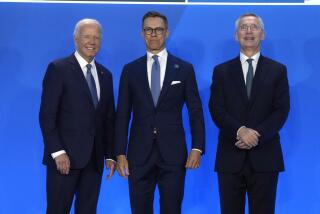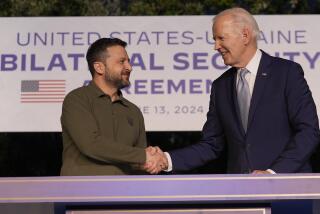Aid Promised for Nuclear Security
- Share via
CALGARY, Canada — CALGARY, Canada -- The world’s leading industrial nations said Thursday that they would provide as much as $20 billion to help Russia and other former Soviet states control the poisonous detritus of the Soviet Union’s weapons programs.
Under the 10-year agreement, the United States will contribute $10 billion and Europe, Canada and Japan will contribute a total of up to $10 billion to secure nuclear, biological and chemical weapons and to clean up the sites where they were made and stored.
The agreement is intended to keep the weapons, and material that can be turned into weapons, from terrorists and governments seeking to develop nuclear devices.
“The attacks of Sept. 11 demonstrated the terrorists are prepared to use any means to cause terror and inflict appalling casualties on innocent people,” the joint statement by the leaders said.
“We commit ourselves to prevent terrorists, or those that harbor them, from acquiring or developing nuclear, chemical, radiological and biological weapons, missiles and related materials, equipment and technology,” they added.
If successful, the accord will give new life to a decade-old U.S. effort to control one of the still-dangerous legacies of the Cold War.
The plan is built around both decommissioning nuclear facilities and weapons and finding work for former Soviet weapons scientists.
President Bush and Russian President Vladimir V. Putin reached formal agreement on it during a brief private meeting Thursday morning before the final sessions of the two-day summit of the Group of 8, which consists of the United States, Russia, Britain, Canada, France, Germany, Italy and Japan.
The accord was one of the major accomplishments at the summit in Kananaskis, a Rocky Mountain ski village about 50 miles west of Calgary.
Sen. Richard G. Lugar (R-Ind.) said recently that 40% of the nuclear storage sites in Russia have been given U.S. aid to increase security and that 20% have received complete security systems.
Although the agreement that was announced Thursday applies to only former Soviet states, the problem extends well beyond those nations.
Former Sen. Sam Nunn (D-Ga.) has estimated that about 20 tons of highly enriched uranium are at 345 civilian research sites in 58 countries, at least some of them only lightly guarded.
The question of how to guard nuclear, biological and chemical material so it doesn’t fall into dangerous hands has been a central issue in the evolving relationship between Washington and Moscow.
Putin and Bush speak often about the improvements they have achieved in bilateral ties. However, Russia’s support for Iran’s civilian nuclear power development has been a sore point. The U.S. fears that Iran could develop nuclear weapons using the assistance Moscow is providing.
Condoleezza Rice, Bush’s national security advisor, said the United States was committed to delivering the $10 billion, but she acknowledged that there was no guarantee the others would come through with their shares.
However, she said, “We’re confident, given the spirit around this global partnership, that the commitments are going to reach into that area.”
Another senior Bush administration official said the program would bring Europe and Japan in “a much more major way” into what has been largely a U.S. effort in nonproliferation, disarmament and counter-terrorism.
The official, speaking on the condition of anonymity, said each nation would set up its own projects with Russia.
He said the Russians have 40,000 tons of chemical weapons they must destroy under an international treaty.
Some of the nuclear material would be stored and some would be converted into fuel for nuclear reactors, he said.
“But what we’re trying to do in the first place is make sure that this material is under control, that it’s not capable of being leaked out of Russian command and getting to terrorists or to rogue states,” he said.
The material comes from a variety of sources, according to the administration.
The final issue resolved in negotiations dealt with Russia’s acceptance of provisions monitoring how the money is spent and how the cleanup progresses. Moscow agreed to give the other G-8 members access to disposal sites and auditing authority.
More to Read
Sign up for Essential California
The most important California stories and recommendations in your inbox every morning.
You may occasionally receive promotional content from the Los Angeles Times.













